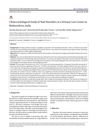 73 citations,
January 2013 in “European journal of dermatology/EJD. European journal of dermatology”
73 citations,
January 2013 in “European journal of dermatology/EJD. European journal of dermatology” Antioxidants may help fight oxidative stress linked to autoimmune skin diseases.
 61 citations,
April 2012 in “British Journal of Dermatology”
61 citations,
April 2012 in “British Journal of Dermatology” Caucasian women's hair appears thickest in their 20s, with perceived thinning after mid-30s due to both decreasing density and diameter.
 48 citations,
March 2019 in “Frontiers in Physiology”
48 citations,
March 2019 in “Frontiers in Physiology” Wounds on the face usually heal with scars, but understanding how some wounds heal without scars could lead to better treatments.
 44 citations,
September 2015 in “Annals of Oncology”
44 citations,
September 2015 in “Annals of Oncology” Targeted cancer therapies have a significant but lower risk of causing hair loss compared to chemotherapy.
 32 citations,
January 2021 in “Molecules”
32 citations,
January 2021 in “Molecules” Some Middle Eastern plants may help treat diabetes and could be alternatives to current drugs, but more research is needed.
 19 citations,
July 2020 in “Journal of cancer survivorship”
19 citations,
July 2020 in “Journal of cancer survivorship” People undergoing chemotherapy need better support and information to cope with hair loss.
 15 citations,
November 2015 in “Pharmacopsychiatry”
15 citations,
November 2015 in “Pharmacopsychiatry” α-Blockers and 5-ARIs for BPH can cause sexual dysfunction, including erectile and ejaculatory issues.
 8 citations,
February 2020 in “Fertility and Sterility”
8 citations,
February 2020 in “Fertility and Sterility” Operative hysteroscopy is still the main treatment for Asherman syndrome, but more research is needed on post-surgery methods.
 7 citations,
April 2021 in “Dermatology and Therapy”
7 citations,
April 2021 in “Dermatology and Therapy” H-1 antihistamines may help with various skin conditions, but more research is needed to confirm their effectiveness.
 5 citations,
February 2023 in “European journal of endocrinology”
5 citations,
February 2023 in “European journal of endocrinology” Older patients with Cushing's syndrome often have different symptoms and treatment outcomes compared to younger patients.
 2 citations,
October 2021 in “Journal of skin and stem cell”
2 citations,
October 2021 in “Journal of skin and stem cell” Nail disorders are often related to jobs like housework and manual labor, with cosmetic issues being the main concern, and are commonly caused by skin diseases like psoriasis.
 2 citations,
August 2021 in “Journal of Turkish sleep medicine”
2 citations,
August 2021 in “Journal of Turkish sleep medicine” People with polycystic ovary syndrome are more likely to have poor sleep, restless legs syndrome, anxiety, and depression.
 1 citations,
June 2023 in “Curēus”
1 citations,
June 2023 in “Curēus” PCOS affects nearly 25% of female medical and dental students, impacting their academic and social lives.
 1 citations,
November 2022 in “World Family Medicine Journal /Middle East Journal of Family Medicine”
1 citations,
November 2022 in “World Family Medicine Journal /Middle East Journal of Family Medicine” People in Jeddah know about Vitamin D and its sources but are unclear on how much they need daily, and while many women take supplements, attitudes towards increasing Vitamin D levels vary.
 1 citations,
November 2015 in “Cochrane library”
1 citations,
November 2015 in “Cochrane library” 5-alpha-reductase inhibitors help treat urinary symptoms from an enlarged prostate.
 December 2024 in “Deleted Journal”
December 2024 in “Deleted Journal” New therapies show promise for wound healing, but more research is needed for safe, affordable options.
 April 2024 in “JMIR infodemiology”
April 2024 in “JMIR infodemiology” TikTok videos show that people with Lupus often discuss symptoms and their significant impact on mental health, face diagnostic delays, have mixed views on treatments, and feel isolated despite support.
 April 2024 in “Research Square (Research Square)”
April 2024 in “Research Square (Research Square)” A 27-year-old with APS-1 showed improvement in symptoms after treatment.
 February 2024 in “International neuropsychiatric disease journal”
February 2024 in “International neuropsychiatric disease journal” Alopecia areata severely impacts quality of life, mental health, and work productivity.
 February 2024 in “Journal of Education, Health and Sport”
February 2024 in “Journal of Education, Health and Sport” Different treatments for PCOS should be tailored to the individual, including lifestyle changes and various medications.
 October 2023 in “Advancement in yoga and physical therapy”
October 2023 in “Advancement in yoga and physical therapy” More research is needed before using brown fat to treat polycystic ovary syndrome.

Women with PCOS are at higher risk for gum disease, and managing shared risk factors can help both conditions.

Stress significantly contributes to hair loss, especially in women and those aged 31-40.

Lupus patients on TikTok feel isolated, face medical gaslighting, and prefer non-drug treatments.
 October 2020 in “Veterinary Dermatology”
October 2020 in “Veterinary Dermatology” New treatments and diagnostic methods for various animal skin conditions showed promising results.
 July 2018 in “Plastic and Aesthetic Nursing”
July 2018 in “Plastic and Aesthetic Nursing” The 2018 ISPAN Meeting emphasized hands-on learning, patient safety, and professional growth in medical aesthetics and reconstructive practices.
 January 2017 in “Acta dermato-venereologica”
January 2017 in “Acta dermato-venereologica” The congress showed that psychological therapy can help skin condition patients, social media affects acne stigma, education improves atopic dermatitis, and patient satisfaction in dermatology is high, especially with good doctor engagement.
 1 citations,
October 2022 in “Adolescent Health, Medicine and Therapeutics”
1 citations,
October 2022 in “Adolescent Health, Medicine and Therapeutics” Gender-affirming therapy can cause skin issues like acne and hair loss in transgender adolescents, and more research is needed on its dermatological effects.
February 2025 in “Journal of Cosmetic Dermatology” Patch testing is crucial to reduce allergic reactions in hair loss treatments.
 January 2025 in “Diagnostics”
January 2025 in “Diagnostics” Women with PCOS have distinct retinal changes compared to healthy women.





























